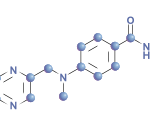 A randomized, placebo-controlled, double-blind, six-month, multicenter Phase 3 study examined the efficacy and safety of the oral Janus kinase inhibitor, tofacitinib, in patients with psoriatic arthritis (PsA) who had an inadequate response to tumor necrosis factor-α (TNF-α) inhibitors.1
A randomized, placebo-controlled, double-blind, six-month, multicenter Phase 3 study examined the efficacy and safety of the oral Janus kinase inhibitor, tofacitinib, in patients with psoriatic arthritis (PsA) who had an inadequate response to tumor necrosis factor-α (TNF-α) inhibitors.1
Study participants had a PsA diagnosis for at least six months, with active disease at screening and baseline. Three hundred and ninety-four patients were treated and randomized into a 2:2:1:1 ratio to receive 5 mg (n=132) or 10 mg tofacitinib twice daily (n=132); or placebo to 5 mg (n=66) or 10 mg tofacitinib twice daily (n=65). Patients who were randomized to receive placebo were blindly advanced to a dosage of twice daily tofacitinib at Month 3.
Use of one conventional synthetic disease-modifying anti-rheumatic drug (DMARD) was required for study entry and continuation. The study’s primary endpoints were the change from baseline in Health Assessment Questionnaire Disability Index (ΔHAQ-DI) at Month 3 and the ACR20 response rate.
Approximately 92% of patients (n=361) completed Month 3, and approximately 88% of patients (n=345) finished Month 6. Baseline disease activity/characteristics and patient demographics were similar across all groups. The primary endpoints were statistically and significantly greater with 5 mg and 10 mg tofacitinib-treated patients compared with placebo-treated patients at Month 3, effects that persisted through Month 6.
The ACR20 response was superior for 5 mg and 10 mg tofacitinib-treated patients compared with placebo-treated patients, which was noted as early as Week 2 of the study (26.7% and 28.8% vs. 13.0%; P≤0.05). Additionally, the Psoriasis Area and Severity Index (PASI) at Month 3 was achieved by 14% of placebo-treated patients, 21% of the 5 mg tofacitinib-treated patients and 43.2% of the 10 mg tofacitinib-treated patients at Month 3, which was considered statistically significant (P<0.0001). The PASI response continued to increase through Month 6 for all treatment groups.
The serious adverse event rate was low, as were study discontinuations due to adverse events. The study had two discontinuations (3%) in the 5 mg tofacitinib-treated patient group, three discontinuations (4.6%) in the 10 mg tofacitinib-treated group, five discontinuations (3.8%) in the placebo to 5 mg tofacitinib-treated group, and 11 discontinuations (8.3%) in the placebo to 10 mg tofacitinib-treated group. The most common adverse events were headache (4.5–9.1%), nasopharyngitis (1.5–10.7%) and upper respiratory tract infection (5.3–10.8%). No deaths or malignancies were reported in this short-term study, and no new safety risks were identified.
Michele B. Kaufman, PharmD, BCGP, is a freelance medical writer based in New York City and a pharmacist at New York Presbyterian Lower Manhattan Hospital.
Reference
- Gladman DD, Rigby W, Azevedo VF, et al. Efficacy and safety of tofacitinib, an oral janus kinase inhibitor, in patients with active psoriatic arthritis and an inadequate response to tumor necrosis factor inhibitors: OPAL beyond, a randomized, double blind, placebo-controlled Phase 3 trial [abstract]. Arthritis Rheumatol. 2016;68 (suppl 10).


